Lowell Week in Review: March 11, 2018
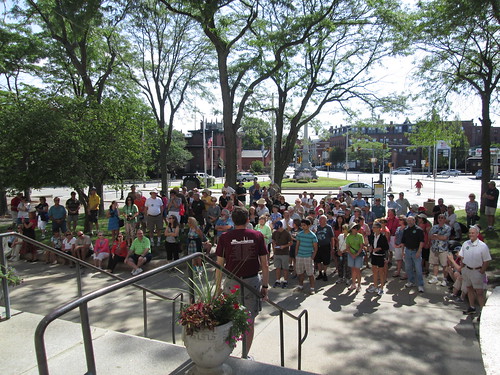
Lowell Walks 2018
Lowell Walks is back for its fourth season of summertime Saturday morning walks. We’re offering seven walks this summer, but they will be supplemented by five more offered by Bob Forrant and Lowell National Historical Park.
Here’s the Lowell Walks 2018 schedule, all Saturdays, all starting at 10 am at Lowell National Historical Park Visitor Center at 246 Market Street:
June 23, 2018 – City Hall & Pollard Memorial Library with Sean Thibodeau
June 30, 2018 – Infamous Lowell Crimes with Kerry Regan Jenness & Wayne Jenness
July 14, 2018 – Downtown Architecture with Steve Stowell (Lowell Historic Board)
July 21, 2018 – Moody Street with Dick Howe & Coalition for a Better Acre
Aug 11, 2018 – Downtown Galleries & Cultural Places with Liz Stewart (COOL)
Aug 25, 2018 – Hamilton Canal District Update with Claire Ricker (Lowell DPD)
Sept 1, 2018 – Lowell in World War One with Dick Howe
Here are the other walks that will be offered this summer, also on Saturdays from the NPS Visitor Center:
June 9, 2018 – Lowell National Park 40th Birthday Walk
June 16, 2018 – Abolitionism in Lowell with Bob Forrant (10am)
July 7, 2018 – Little Canada with Bob Forrant (1pm)
Aug 18, 2018 – Immigration History with Bob Forrant (10am)
Sept 8, 2018 – Labor History with Bob Forrant (1pm)
There are also a couple of walks this spring:
On Saturday, April 28, 2018 and again on Sunday, April 29, 2018, both at 1pm, I will lead a City Hall Monuments walking tour that will visit the nearly two dozen civic, ethnic and cultural monuments on the grounds and in the vicinity of Lowell City Hall. These walks are part of the Lowell ArtsWeek celebration. Both begin at Lowell National Park Visitor Center, 246 Market Street.
Then, on Friday, May 11, 2018 at 1pm and again on Saturday, May 12, 2018 at 10am, I will lead walking tours of historic Lowell Cemetery. These tours begin at the Lawrence Street gate. Parking is available inside the cemetery.
All of these tours are free, last about 90 minutes, and do not require advanced registration. Just show up and enjoy!
To receive reminders about these walks and other events related to Lowell history, please register for the Lowell Walks email list in the box in the upper right corner of this website.
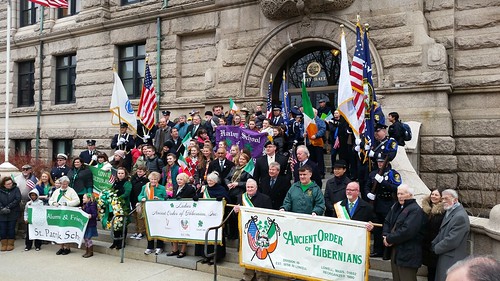
Irish Cultural Week
Congratulations to the Irish Cultural Committee for last Sunday’s kick-off of Irish Cultural Week in Lowell. Despite a chilly morning, several hundred people attended the opening mass at St. Patrick’s Church and then processed to City Hall for the raising of the Irish flag and the laying of a wreath at the Irish monument, all followed by a delicious brunch at St. Patrick’s Church hall.
Unfortunately, the mid-week northeaster and resulting power outages forced the cancellation of Thursday night’s Acre Forum which will be rescheduled at a future date.
Irish Cultural week – really, two weeks – continues through the coming week. Check out the Lowell Irish website for the full schedule.
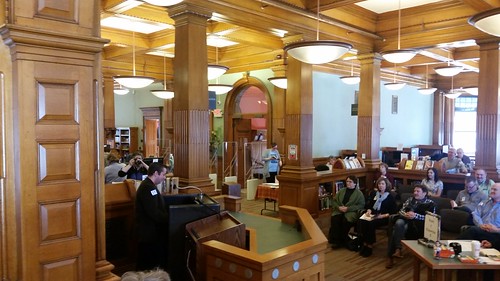
“On the Road” Marathon reading inside Pollard Memorial Library
“On the Road” Marathon
Congratulations also to everyone who participated in yesterday’s inaugural marathon reading of Jack Kerouac’s On The Road. Published in 1957, On the Road was an instant sensation that continues to influence American and global culture today. To celebrate this book, and to recognize Jack Kerouac’s 96th birthday, Lowell residents read aloud the entire book in three “rides.”
The First Ride began at the Pollard Memorial Library at noon and lasted until 4pm with 46 different readers. The Second Ride moved to Gallery Z at 167 Market Street where 32 readers participated from 4 until 8pm. The Third (and final) Ride moved down Market Street to UnchARTed where another 30 readers going from 8 until 11 pm wrapped up the book.
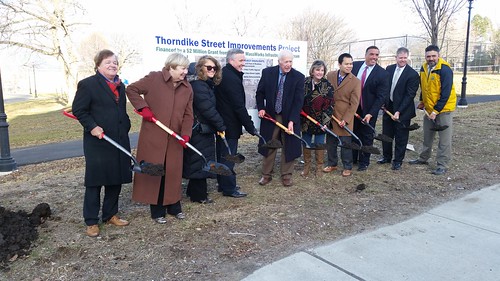
Thorndike Street improvement project groundbreaking
Thorndike Street Groundbreaking
Last Tuesday was the groundbreaking ceremony for the Thorndike Street Improvement Project which got underway this week. Most of the work will be done at night to try to minimize the disruption for those who travel on that roadway.
The project stretches from the entrance to the Gallagher Terminal to the entrance to the Lowell Connector, a stretch of about 1,000 yards. The major outbound alteration will be the addition of a dedicated left turn lane onto Highland Street. This will be a big help since cars waiting to make that turn now regularly block one of the two outbound lanes of Thorndike Street. This project will remove that impediment to outbound traffic.
Coming inbound, the big change will be a dedicated left turn lane into the Gallagher Terminal. This lane will extend back towards the Connector far enough to permit cars using it to enter and exit the Thorndike Exchange project from Thorndike Street.
Another major change coming with this project will be the ability to turn left onto Thorndike Street from Highland Street. Now, you can only turn right (inbound) from Highland onto Thorndike.
One planned improvement outside this phase of the project involves the entrance to the Lowell Connector from Thorndike Street. The ultimate goal, I believe, is to widen that Connector onramp to two lanes so that both outbound lanes of Thorndike will be able to turn onto the Connector. (Now, the right hand outbound lane tends to back up because most of the cars coming from downtown want to get on the Connector). Adding this second lane to the Thorndike Street onramp will require reducing the Connector to one lane outbound from Gorham Street to this point. That shouldn’t have a big impact on traffic, but you can’t widen the onramp without altering the Connector traffic pattern, which is probably why that is waiting until another phase.
At the Tuesday groundbreaking, several speakers mentioned Lowell’s adoption of the state’s Complete Streets Program.
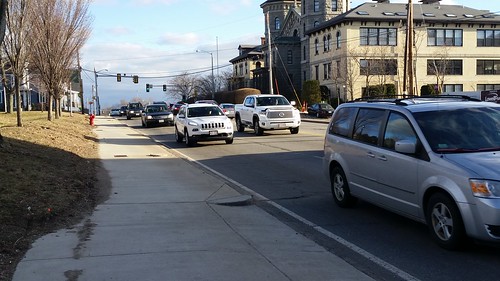
Complete Streets
So what is the Complete Streets Program? It’s a statewide program launched by the Massachusetts Department of Transportation back in 2015 to provide technical assistance and funding incentives to cities and towns to make their roads more walkable, bikeable, and viable for public transit users. One definition of a “complete street” is
“a street that provides safe and accessible options for all travel modes – walking, biking, transit and vehicles – for people of all ages and abilities. Complete Streets improvements may be large scale such as corridor wide improvements or focused on the needs of a single mode.”
Everyone loves funding that comes to the city from state government, so if accessing those funds requires adopting a policy like Complete Streets, then go ahead and adopt it, even if those doing so aren’t committed to it or don’t understand it.
If you watch the City Council debate some of these issues, whether it’s bike lanes or parking policy or widening roads, it becomes clear that for some on the council, the car is still supreme in Lowell. That’s how urban planners thought back in the 1960s and 1970s, but most planning professionals have since concluded that planning around cars (as opposed to planning around people) was a failed policy. But planning for cars instead of people got deeply imbedded in our way of life and it’s tough to move on. Another reason that it’s tough to change is that most who rely on public transit or walking to meet their transportation needs are poorer and tend not to vote, so their needs are slow to be met.
Another factor is that those who truly do believe in a people-centric urban planning policy still struggle with how to effectively influence politics at the local level. However, that may be changing. Here, for instance, is a motion by Councilor Karen Cirillo made and passed at last Tuesday’s council meeting:
Request City Manager provide A Report Updating The City Council Regarding The Lowell Complete Streets Policy Enacted on August 11, 2015 And What Goals For Travel Mode Distribution, i.e. Bicycle Routes, Have Been Developed And/Or Achieved In Accordance With The Policy Within The Stated Incremental Five Year Time Period Which Will End On August 11, 2020.
We’ll be sure to highlight this report when it’s submitted to the council.
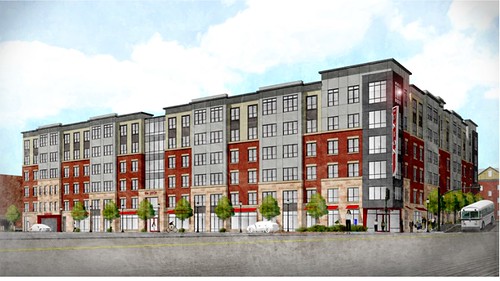
Union Dormitory Defeated
The conflict between a car-centric city and one that follows Complete Streets showed up last Monday when the Lowell Planning Board defeated the private dormitory that was proposed for the former Jeanne d’Arc Credit Union headquarters at Merrimack, Cabot and Market streets. Strangely enough, people on either side of the car versus Complete Streets divide both found reasons to oppose this project, with the car people worrying about not enough parking and the walkability people worrying about the scarcity of ground floor retail space (with some worrying about both).
At the end of the nearly four hour meeting, the Planning Board defeated the request for a special permit for the project by a vote of four to zero. As reasons for that outcome, the Board cited (1) insufficient evidence that the project meets community needs; (2) failure to have adequate parking within 1500 feet; (3) failure to provide for visitor parking; (4) insufficient evidence that the project would meet the minimum transportation requirements; and (5) the size, density and mass of the proposed building was not consistent with the character of the neighborhood. By the same margin, the Board rejected the Site Plan, citing (1) a lack of a plan for lighting; (2) inconsistencies between the submitted plan and the artist rendering shown at the public hearing; and (3) insufficient parking.
The following night, several City Councilors urged the city’s Planning Department to work with the parcel owner, Jeanne d’Arc Credit Union, to find a new developer who will propose a more acceptable project. While this private dormitory project seems dead, the developer has the right to appeal the decision to Superior Court.

Lights Out
Maybe it was the lengthening amount of daylight, or the relatively mild weather we’d had for the previous couple of weeks, or maybe it was the way that this week’s predicted storm seemed to have fizzled out during the day on Wednesday, but for whatever reason, I was shocked by the amount of devastation we woke up to on Thursday morning. From late Wednesday night until dawn on Thursday, nearly a foot of heavy wet snow fell on the area, bringing down countless trees and big branches, and all the wires that ran amongst them.
My house in the Highlands is usually one of the first to lose power, but my neighborhood was spared this time. That was partly a matter of luck, because a lot of trees came down, just not on top of critical wires, but also because last fall’s storm, during which we did lose power for a couple of days, may have already taken down the most vulnerable trees.
After Northeasters in early January (January 4) and again a week ago (March 2), I wrote about the extreme flooding that occurred along the coast and especially in downtown Boston. Now we have this storm with massive power outages throughout Greater Lowell (with some people still waiting for restoration). Is it time to get serious about confronting climate change? Or will we just stock up on sump pumps and generators and continue to chuckle when the ignorant among us ask how the globe can be warming when it’s so cold outside?
If you’re interested in getting more involved locally, check out the websites of the Lowell Sustainability Council, 350Mass of Greater Lowell, or Sierra Club of the Merrimack Valley. And plan to attend and participate in the Lowell Earth Day Parade and Festival on Sunday, April 22, 2018 from noon until 4 pm beginning at Lowell National Park Visitors Center.
Oh, and don’t put away your generators quite yet. There’s another Northeaster forecast for Monday night with 4 to 8 inches of snow expected.
A few days after the council meeting a interesting article appeared in the Boston Herald. BC/BS was investing in a bicycle program in Boston and few other Massachusetts communities. Mayor Walsh quickly supported the investment in bicycle use for Boston and commuter riders. Although I do own a bike and occasional ride it to work I’m not a daily rider and am not familiar with these bicycle programs. What is important is the increasing requirements to include bicycles use in the planning, reinvestment and building of new roads. If the City wants to receive new monies for road improvements and be a recipient of programs offered by private companies such as BC/BS than it needs to be more open to the discussion of investing and use by alternative means of transportation. I do believe the discussion has began but a new more open dialogue needs to be activated before the city can be a partner in such programs.
I’m glad to see some afternoon Lowell Walks scheduled!